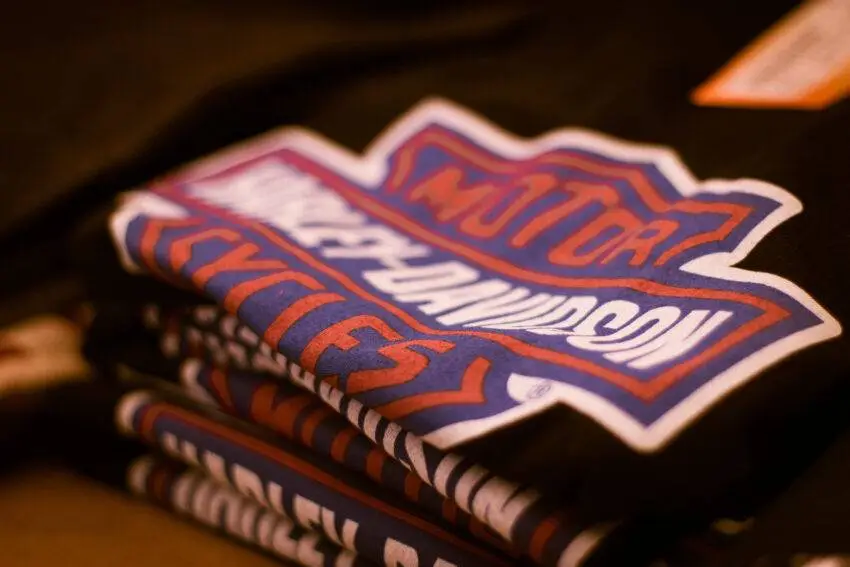Harley-Davidson has accused Next of appropriating its logo with ‘motorbike-inspired’ graphics on children’s T-shirts, sparking a dispute that has reached the High Court. The American motorcycle giant insists that the design closely resembles its branding, which may cause confusion among consumers. The ongoing legal battle highlights recurring issues faced by Harley-Davidson regarding intellectual property.
Alleged Logo Replication
Harley-Davidson has filed a lawsuit against Next, demanding the destruction of long-sleeve T-shirts featuring biker angel wings with flames, which it claims replicate its branding. According to court documents, Harley-Davidson argues that the T-shirts incorporate graphic material and text often seen in the context of motorcycle-based branding, specifically theirs.
The contentious T-shirts, marketed for children aged 3 to 16, are described on Next’s website as having a ‘motorbike-inspired graphic with flame sleeve prints.’ Harley-Davidson asserts that these designs would evoke its imagery for many in the public and potentially cause consumer confusion.
Legal Proceedings
Both companies have refrained from commenting publicly on the ongoing legal battle. This litigation by Harley-Davidson is part of a broader pattern of high-profile legal actions to protect its brand identity, with the company generating around 5% of its revenue from clothing sales.
Previously, Harley-Davidson reported earnings of $244 million (£192 million) from apparel sales, out of a total revenue of $4.85 billion. This underscores the significance of apparel in its business model, despite its primary revenue stream remaining the sale of motorcycles, accessories, and parts.
Decline in Motorcycle Sales
Despite its strong brand presence, Harley-Davidson has faced challenges in its core market. The company reported a 23% drop in profits for the first quarter, citing higher borrowing costs that have dampened demand for its more expensive motorcycles.
CEO Jochen Zeitz highlighted that the company is just entering the riding season, with much relying on second-quarter results. He stated, ‘We’re really just entering the riding season…and a lot depends on the second quarter, which is why we have not changed our guidance at this point in time.’
Revenue Projections
Harley-Davidson has projected that its motorcycle business revenue will remain flat or decrease by up to 9% this year. This cautious outlook is reflective of the broader economic challenges impacting consumer spending on high-ticket items like motorcycles.
The dispute with Next over the alleged logo infringement comes at a critical time for the company, as it navigates financial pressures and attempts to protect its brand equity in a competitive market.
Previous Legal Battles
This legal confrontation is not Harley-Davidson’s first. In a notable 2017 case, the company sued Urban Outfitters over allegations of selling ‘mutilated’ versions of its shirts.
The Urban Outfitters case involved accusations that the retailer had altered Harley-Davidson shirts by removing sleeves and labels, replacing them with its own ‘Urban Renewal’ branding. The matter was eventually settled with Urban Outfitters ceasing the sale of all Harley-branded merchandise.
Intellectual Property and Brand Protection
Harley-Davidson’s actions reflect a broader trend among companies to fiercely protect their intellectual property. By initiating legal proceedings against Next, Harley-Davidson aims to preserve its distinctive brand image and prevent potential market dilution.
Such legal measures are crucial for companies like Harley-Davidson, which has invested significantly in building a strong brand identity over the years. The outcome of this case may set a precedent for how similar intellectual property disputes are handled in the future.
Impact on Retail Market
If Harley-Davidson succeeds in its legal battle, it could prompt other companies to more vigorously defend their brand assets.
This case could also influence retailers to be more cautious in their design choices, ensuring that new products do not infringe on existing trademarks. Such heightened vigilance might significantly impact how retailers approach product development and branding in the future.
The ongoing dispute between Harley-Davidson and Next underlines the importance of brand protection in the retail industry. Companies must navigate complex legal landscapes to safeguard their intellectual property. The outcome of this high-profile case could have lasting implications for both Harley-Davidson’s brand and the broader market.

